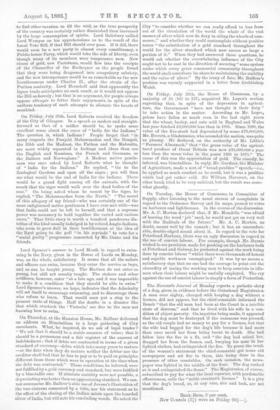On Thursday, at the Mansion House, Mr. Balfour delivered an
address on Bimetallism to a large gathering of City merchants. What, he inquired, do we ask of legal tender ? " We ask that it should be a stable measure of value; that it should be a permanent and a fair register of the amount of indebtedness ; that if debts are contracted in terms of a given standard of currency—debts which take many years to mature —at the date when they do mature neither the debtor nor the creditor shall find that he has to pay or to be paid on principles different from those which were in operation at the time when the debt was contracted." These conditions, he inferred, were not fulfilled by a gold currency and standard, but were fulfilled by a bimetallic one. If absolute stability were not possible, a 'depreciating was better than an appreciating standard. We can- not summarise Mr. Balfour's able use of Jevons's illustration of the two cisterns connected by a tube, nor his statement as to the effect of the closing of the Indian mints upon the hoarded silver of India, but will note his concluding words. He asked the City "to consider whether we can really afford to lose from out of the circulation of the world the whole of the vast masses of silver which now do duty in oiling the wheels of com- merce;" and whether they could contemplate without positive terror "the substitution of a gold standard throughout the world for the silver standard which now covers so large a portion of it." When they had answered these questions, he would ask whether the overwhelming influence of the City ought not to be cast in the direction of securing some system under which every great commercial community throughout the world shall contribute its share to maintaining the stability and the value of silver." By the irony of fate, Mr. Balfour's position was warmly supported in a letter from Archbishop Walsh.


































 Previous page
Previous page